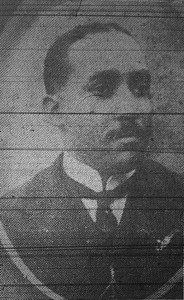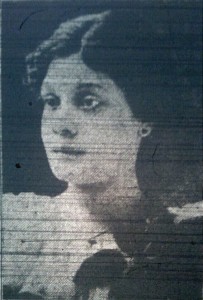In the contemporary press, the term “power couple”has become commonplace as a reference to husband-and-wife duos who make headway in the arts, sports, business, or high society. Within New Orleans’ black community in the early twentieth century, one “power couple” gained a reputation for the interest they took in the civic, educational, and social advancement of their people. This noteworthy couple was George W. Guidry and Deborah Johnson Guidry. Upon his death, Mr. Guidry was described as “a keen factor in everything pertaining to [the] race’s welfare.” Likewise, at her demise, Mrs. Guidry was called “a devoted teacher, ardent social worker, and a real philanthropist.”
George Washington Guidry was born on 25 January 1874. Early in life, Guidry followed the barbering profession. His thrift and business tact enabled him to enter the restaurant business. For over twenty-five years, he maintained a restaurant and saloon at 1500 Cleveland Avenue (corner Howard). He began his business in partnership with Samuel Allen, another ambitious young man, before later acquiring sole ownership. He became one of the initial board members and shareholders in the People’s Industrial Life Insurance Company in 1909. Six years later, he engaged in another significant partnership, his marriage to Miss Deborah B. Johnson, a beautiful and popular teacher in the city’s public schools.
George W. Guidry was a true race man, ever ready to offer advice and encouragement to younger men looking to enter business or advance in leadership. He was an active supporter of the Colored Young Men’s Christian Association (Y.M.C.A.) which was founded in 1905, under the leadership of Professor Albert Wicker. He was an member and contributor to the local branch of the N.A.A.C.P. Along with his wife, Mr. Guidry was a leader in the fight that the local branch waged against residential segregation in the 1920s. He was active in the Republican Party and was “strong for the building up of a party in this city that would enable [his people] to demand rather than beg.” Guidry, like so many race men of that era, used his success in business to contribute to efforts for the advancement of his people. He was a 32° Mason, Mount Olive Lodge No. 21; member of Zenith Lodge No. 175, Knights of Pythias; Member of Crescent City Lodge No. 299, Improved Benevolent Protective Order of Elks of the World; the Economy Society. He also served, along with his wife, on the Board of the Hume Day Nursery attached to Central Congregational Church. George Washington Guidry died on 13 March 1932 at fifty-eight years old. He was buried two days later from Central Congregational Church, of which he had been an active member.
Deborah Buida Johnson was born in New Orleans on 25 October 1872 to Abram Moore Johnson and Louisa Hopkins. She received her education from Straight University, from which she graduated in 1891. During her time at Straight, she was a peer of several notable women: Valena C. Jones, Hattie V. Feger, Mary D. Coghill, Alice M. Dunbar-Nelson, and Julia L. Nickerson. The young Miss Johnson began her teaching career in the Daniel Hand School, the model school which comprised the elementary department of Straight University. She later entered the city’s public schools, where she taught for just over twenty years.
Like so many of the city’s leading race women, she was a longtime member of the Phyllis Wheatley Club. This organization, founded in 1895 by Mrs. Sylvanie F. Williams, gave birth to the Flint-Goodridge Hospital and was affiliated with the women’s suffrage movement. Mrs. Guidry was best-known for her work in the local branch of the N.A.A.C.P. She served as Secretary of the branch from 1925 until her death in 1932. She maintained regular correspondence with the Association’s national office and reported news of the branch’s activities to The Crisis. She was a leader in garnering public support and contributions for the fight against residential segregation between 1924 and 1927. This fight ended in a Supreme Court victory which overturned the segregation ordinance in New Orleans and across the country. She and her husband gave generously to the cause themselves. She traveled the state speaking on the Association’s anti-lynching campaign and encouraging blacks to pay their poll taxes. Mrs. Guidry was also one of the principal fundraisers for completion of the Sylvanie Williams Pool for Colored Children. Mr. and Mrs. Guidry were generous supporters of the Community Chest and The Daily Picayune‘s Colored Doll and Toy Fund. Mrs. Guidry devoted much of her time to the Isabella Hume Day Nursery at Central Congregational Church. The nursery provided care and instruction for children whose mothers were employed and would otherwise have no where to send them. Upon the death of her husband in 1931, Mrs. Guidry took charge of his business and assumed his seat on the board of People’s Insurance Company. Never having fully recovered from the death of her beloved husband, Mrs. Deborah J. Guidry died, just a year-and-a-half after him, on 2 October 1933 at sixty-one years old. She was buried two days later from Saint Luke’s Episcopal Church. Mrs. Guidry was survived by her siblings: Mrs. Eva Johnson Allen, Miss Leah Johnson, and Mr. Benjamin A. Johnson.
This couple, who gave so generously of their time, talent, and treasure for the uplift of their race, is laid to rest in Saint Louis Cemetery No. 3.
Life is real! Life is earnest!
And the grave is not its goal;
Dust thou art, to dust returnest,
Was not spoken of the soul …
Lives of great men all remind us
We can make our lives sublime,
And, departing, leave behind us
Footprints on the sands of time …
Let us, then, be up and doing,
With a heart for any fate;
Still achieving, still pursuing,
Learn to labor and to wait.
From A Psalm of Life by Henry Wadsworth Longfellow
Sources: The Louisiana Weekly, 19 March 1932, page 1; 7 October 1933, page 1; Lee Sartain, Invisible Activists: Women of the Louisiana NAACP and the Struggle for Civil Rights, 1915–1945 (Baton Rouge: Louisiana State University Press, 2007).
Jari C. Honora




